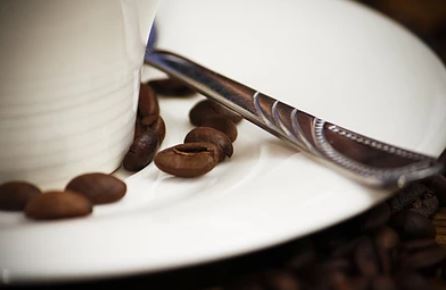
If you have trouble losing weight and consume caffeine daily, then it may be worthwhile to stop it. Here are some reasons why.
Caffeine causes the body to release the stress hormone cortisol. In other words, caffeine prepares your body to run from a tiger. Cortisol breaks muscle down into amino acids, triggers the liver to release glucose, and pulls fatty acids from fat tissue so you have energy to for a quick get away.
However, most of us don’t drink caffeinated beverages in preparation for vigorous physical activity. Instead, we’re sedentary, driving to work, reading email or eating, for example. The energy mobilized by this caffeine induced cortisol surge has nowhere to go, so it is stored, usually as fat.
High cortisol levels also disrupt your sleep cycle. To make matters worse, poor quality sleep itself increases cortisol levels. This creates a vicious circle. Caffeine perks you up after a poor night of sleep. Then you sleep poorly again and the cycle starts all over. The simplest way to weight loss I have found is to sleep better. Stopping daily caffeine use is the best way to promote quality sleep.
Many weight loss supplements contain caffeine, likely for a diuretic effect. Chlorogenic acid is a polyphenol found in unroasted coffee beans. Some claim it increases your metabolic rate. Whether or not this is true, roasting destroys chlorogenic acid and other polyphenols. So, that cup of Joe won’t help you burn fat.
Stopping caffeine without a safety net can be brutal. You need a soft place to land. Here are some healthier ways to get energized, then you can proceed to get off the caffeine.
Start your day with lemon water. One-half fresh lemon squeezed into eight ounces of water alkalizes your body pH, charging up all your cellular processes. It can also bring on a bowel movement, a reason many people use coffee. Rinse your mouth afterward to protect your tooth enamel.
Apple cider vinegar is also an excellent alkalizer. Take one to two tablespoons alone or mixed with 1/2 fresh lemon juice.
Stay hydrated. Not only does adequate hydration cut your appetite but it can clear your head and give you energy.
Keep your blood sugar even. Nothing causes a surge in cortisol, or cravings for caffeine, like a drop in blood sugar. Many of my patients report the HealthSpan Metabolic Reset significantly reduces or eliminates their cravings for caffeine and sugar.
Regular moderate exercise energizes you without caffeine, increases your stress resistance and prevents cortisol surges. Initially, your body may perceive walking 2 miles in 40 minutes as stressful and cortisol will be released. But as your physical condition improves and you can walk 2 miles more easily or in less time, less cortisol is released. It’s just not as stressful. The better your physical condition, the less cortisol released during times of emotional stress, too.
Start your day with one my “big five” nervous system tone reducers: Mindfulness practice, contemplative prayer, restorative yoga, tai chi and chi gong. All have all been shown to lower cortisol levels. Regular practice can lead to sustained reductions in cortisol. Most CEOs start their day with one of these practices because it helps them handle the pressure of their position.
Once you adopt a few of these strategies, you may already be craving less caffeine. One way stop caffeine is to take a weekend to get through the headache and other withdrawal symptoms. It’s rough but it’s done. Another is to cut back a little each day. When a headache or other symptom comes on, drink half a cup of coffee, tea or other caffeinated beverage. Gradually make this ¼ cup as needed. Soon enough you won’t need it at all. The drawback of this gradual approach is some people never get to zero. So it takes commitment. Switching to decaf doesn’t work. It still increases cortisol levels because caffeine isn’t the only thing in caffeinated food and beverages that increases cortisol levels.
So keep caffeine a treat, not a daily occurrence. Lower cortisol levels can equal lower body weight, better sleep and physical as well as emotional wellbeing.

